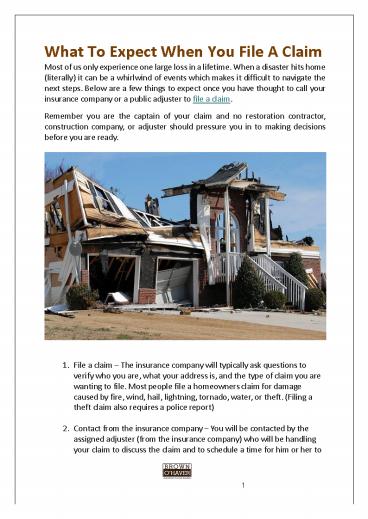What To Expect When You File A Claim - PowerPoint PPT Presentation
Title:
What To Expect When You File A Claim
Description:
Handling an insurance claim can be stressful and arduous. Our goal as a public adjuster is to provide a service that allows the client to be involved in the claim without having to do the tedious and time-consuming aspects of the claim. – PowerPoint PPT presentation
Number of Views:0
Title: What To Expect When You File A Claim
1
What To Expect When You File A Claim
Most of us only experience one large loss in a
lifetime. When a disaster hits home (literally)
it can be a whirlwind of events which makes it
difficult to navigate the next steps. Below are
a few things to expect once you have thought to
call your insurance company or a public adjuster
to file a claim. Remember you are the captain of
your claim and no restoration contractor,
construction company, or adjuster should pressure
you in to making decisions before you are ready.
- File a claim The insurance company will
typically ask questions to verify who you are,
what your address is, and the type of claim you
are wanting to file. Most people file a
homeowners claim for damage caused by fire,
wind, hail, lightning, tornado, water, or theft.
(Filing a theft claim also requires a police
report) - Contact from the insurance company You will be
contacted by the assigned adjuster (from the
insurance company) who will be handling your
claim to discuss the claim and to schedule a time
for him or her to
2
- inspect the damages.
- Additional Living Expenses(ALE) Depending on
the damage to your home and its livability, the
adjuster will assist in getting a hotel room
until you are able to move into an extended
living/rental home. Insurance companies
typically contract a third party to assist in
locating a rental home for you and your family.
However, you can opt to find a rental home on
your own to not pay fees to the third party
company. Additionally, you should keep receipts
for all purchases so that you can be reimbursed
for them. This does not include gas receipts.
However, you can be reimbursed for the
additional mileage you and your family have to
drive during the time you are out of your home. - Structure inspection The adjuster will
primarily handle the structure portion of your
claim during his/her onsite inspection. He/She
will take photos of the damages and prepare an
estimate for the repairs. If you hire a public
adjuster, we will be present at the inspection
verifying the adjuster documents the damages
appropriately. - Personal property inspection You will be
primarily responsible for preparing a list of
your personal belongings that were damaged from
the loss. If you hire a public adjuster, we will
perform an onsite inventory and assist in
documenting the damaged items and preparing the
list for you. - Estimate Depending on the insurance company,
the adjuster, their workload, and the type of
loss, it could take anywhere from two days to a
month to receive an estimate from the adjuster. - Initial payment Once you receive an estimate
from the insurance company you should also
receive an actual cash value payment for the
repairs. Actual cash value (ACV) means the
replacement cost (RCV) minus depreciation (a
deduction based on the age of the home/item
which you may be able to recover later) and the
deductible (the amount the insurance company
holds onto until a limit is met within - your policy). This payment is not a settlement
for your claim, it is the initial amount that
the insurance company agrees the damages are
going to cost.
3
- Choosing a contractor It is important to find a
contractor who you - trust to do the repairs to your home, dont
settle for the contractor the insurance company
recommends. We suggest getting an estimate from
at least two contractors without providing them
the insurance estimate so that you can know what
the actual cost of the repairs will be and to
make sure you arent being overcharged for the
job. - Supplements If your contractors estimate is
higher and/or includes more work than what the
insurance company estimated, you can submit your
contractors estimate as a supplement for the
insurance company to include with their
estimate. Not every item will automatically be
included depending on why it needs to be done as
part of the work. When the insurance company
revises their estimate and it increases, there
will be additional ACV payments issued for the
revisions. - Depreciation When the work to your home is
complete the contractor will provide you with a
final invoice or a job completion form that you
will submit to the insurance company to recover
the depreciation. - Handling an insurance claim can be stressful and
arduous. Our goal as a public adjuster is to
provide a service that allows the client to be
involved in the claim without having to do the
tedious and time consuming aspects of the claim.
A public adjuster can help you with all ten of
these aspects of the claim. This service not
only takes the burden off the client but also
increases recovery because it is done by an
expert who is trained to handle insurance claims
every day.































